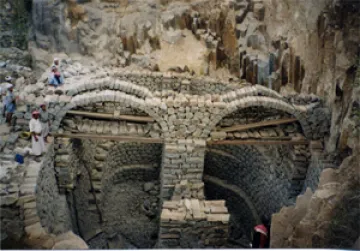The collection and management of flood- or rainwaters to increase water availability for domestic, agricultural or ecosystem use, or “water harvesting”, has been a traditional activity in the Indian Subcontinent, the Middle East, North and East Africa, and the Americas for millennia. Water harvesting is also now a growing practice especially in semi-arid zones. It is a key activity in helping poorer communities in rural and urban areas to find water security, thereby promoting sustainable livelihoods.
Water harvesting, encompassing both rainwater harvesting and managed aquifer recharge (MAR), was identified as a topic of interest to G-WADI at its second global meeting in Paris in 2005. A workshop on the topic was held in November 2006 in Aleppo, Syria, organized by ICARDA coordinated by Oxford University and sponsored by DfID UK and UNESCO (Tehran and Cairo). With an emphasis on case studies, the meeting results were recorded and may be accessed here (5 Mb). Many of the presentations are available here.
Also in 2006, a UNESCO-sponsored National Seminar on Rainwater Harvesting and Water Management was organized by the The Institution of Engineers (India) in Nagpur, India. Twenty-six of the papers from that meeting were published by the Institution of Engineers (P.K. Naik and B. Neupane, eds.) in a publication Rainwater Harvesting Practices. This publication is available online here.
In the following years, much of G-WADI's work in water harvesting took place in Latin America. In 2007, the UNESCO-affiliated center CAZALAC, the UNESCO-IHP Regional Office in Montevideo, Uruguay and G-WADI held an International Workshop on Techniques to Increase Water Supply in Zones Showing Water Shortage, in Santiago, Chile. The main topics included were water catchment from fog and dewdrops, rainwater harvesting and aquifer recharge in addition to desalinization and water re-use. The program and links to many of the presentations are available here, from CAZALAC.
Three years later, in 2010, in collaboration with CAZALAC, Ghent University and others, G-WADI organized a conference on Arid and Semi Arid Development through Water Augmentation (ASADWA). Rainfall-Runoff Water Harvesting and Fog harvesting had dedicated sessions, and related topics such as Aquifer Management and Recharge and Water Reuse were also covered. Ghent University has a website dedicated to the conference, including a link to the proceedings volume.
In March 2017, UNESCO's Regional Office for Science and Technology for LAC, their Santiago office, CAZALAC and G-WADI held an International Seminar on Water Harvesting Techniques and Aquifer Recharge at the FAO building in Santiago, Chile. Twenty-three case studies from Latin America and elsewhere, along with regional summaries, were presented. Most of the abstracts or presentations are available from CAZALAC here.
Most significantly for G-WADI's water harvesting activities, the "Regional Centre on Capacity Development and Research in Water Harvesting", or RCWH, was established in Khartoum, Sudan as a UNESCO "Category 2 Center" in 2014. The aim of the center is "to provide training and research opportunities; generate and provide scientific and technical information and support the exchange of information, in particular with regard to local scientific, technical and managerial knowledge, in the various domains of water harvesting". In the last several years, often in collaboration with the Water Research Center of the University of Khartoum, the center has supported training courses on Design and Construction of Water Harvesting Projects, Subsurface Dams as Water Harvesting Structures; The Role of Stakeholders in Promoting the Sustainable Development Goals Related to the Water Harvesting, and many others. In September 2018 it organized an International Seminar on Rainwater Harvesting Techniques - Towards Effective Adaptation Strategies” in Khartoum.
Additional information on water harvesting, including concepts behind water harvesting, a proposed classification system, its suitability for various purposes, and additional case studies, may be found in "Water Harvesting – Guidelines to Good Practice” published in 2013 by WOCAT, in collaboration with several other organizations.

